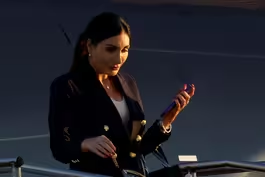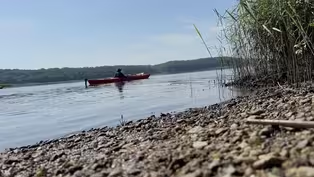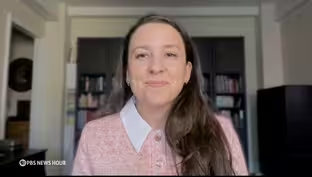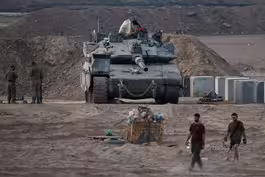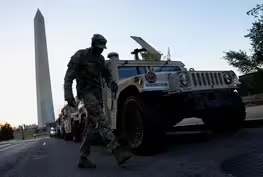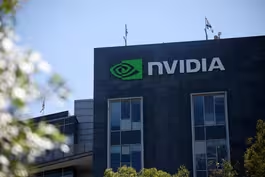
Trump says Putin will face consequences if he won't end war
Clip: 8/13/2025 | 7m 57sVideo has Closed Captions
Ahead of summit, Trump says Russia will face consequences if Putin won't end Ukraine war
President Trump issued a new threat to punish Russia if it doesn't end the war in Ukraine. It comes two days before a high-stakes summit in Alaska with Vladimir Putin. The president also spoke with European leaders, including Ukrainian President Zelenskyy, who said that Trump agreed to their principles on the best way to try and end the war. Nick Schifrin discussed more with Samuel Charap of RAND.
Problems playing video? | Closed Captioning Feedback
Problems playing video? | Closed Captioning Feedback
Major corporate funding for the PBS News Hour is provided by BDO, BNSF, Consumer Cellular, American Cruise Lines, and Raymond James. Funding for the PBS NewsHour Weekend is provided by...

Trump says Putin will face consequences if he won't end war
Clip: 8/13/2025 | 7m 57sVideo has Closed Captions
President Trump issued a new threat to punish Russia if it doesn't end the war in Ukraine. It comes two days before a high-stakes summit in Alaska with Vladimir Putin. The president also spoke with European leaders, including Ukrainian President Zelenskyy, who said that Trump agreed to their principles on the best way to try and end the war. Nick Schifrin discussed more with Samuel Charap of RAND.
Problems playing video? | Closed Captioning Feedback
How to Watch PBS News Hour
PBS News Hour is available to stream on pbs.org and the free PBS App, available on iPhone, Apple TV, Android TV, Android smartphones, Amazon Fire TV, Amazon Fire Tablet, Roku, Samsung Smart TV, and Vizio.
Providing Support for PBS.org
Learn Moreabout PBS online sponsorshipAMNA NAWAZ: Welcome to the "News Hour."
President Trump today issued a new threat to punish Russia if it doesn't end the war in Ukraine just two days before a high-stakes summit in Anchorage with Russian President Vladimir Putin.
Mr. Trump also spoke with European leaders, including Ukrainian President Volodymyr Zelenskyy, who said that Mr. Trump agreed to their principles on the best way to try and end the bloody 3.5-year war.
Nick Schifrin reports.
NICK SCHIFRIN: As Ukrainian soldiers today struggle to hold the front line, 5,000 miles away, President Trump lobbed a new threat at Russian President Putin.
QUESTION: Will Russia face any consequences if Vladimir Putin does not agree to stop the war after your meeting on Friday?
DONALD TRUMP, President of the United States: Yes, they will, yes.
QUESTION: What will the consequences be?
DONALD TRUMP: There will be consequences.
QUESTION: Sanctions?
Tariffs?
DONALD TRUMP: There will be -- I don't have to say.
There will be very severe consequences.
NICK SCHIFRIN: U.S. officials tell "PBS News Hour" President Trump could target Russian energy exports or countries that import Russian oil.
But President Trump has made similar threats before, and he would only punish Putin if, and it's a big if, President Trump concludes Putin is unwilling to end the war.
If Friday's Anchorage summit goes well, President Trump said today he would push for a follow-up meeting with Ukrainian President Volodymyr Zelenskyy and Putin.
DONALD TRUMP: If the first one goes OK, we will have a quick second one.
I would like to do it almost immediately, and we will have a quick second meeting between President Putin and President Zelenskyy and myself if they'd like to have me there, if the second meeting takes place.
Now, there may be no second meeting, because of I feel that it's not appropriate to have it because I didn't get the answers that we have to have, then we're not going to have a second meeting.
NICK SCHIFRIN: In Berlin today, Zelenskyy, alongside German Chancellor Friedrich Merz, met with other European leaders for a virtual summit that included President Trump.
They presented a united front and said President Trump agreed with their requests.
Any deal must start with a cease-fire, provide Ukraine security guarantees, and only Zelenskyy could decide whether to swap land with Russia.
FRIEDRICH MERZ, German Chancellor (through translator): Fundamental European and Ukrainian security interests must be safeguarded in Alaska.
That was the message we Europeans conveyed to U.S. President Trump today.
And I can say that we were in broad agreement.
DONALD TRUMP: We had a very good call.
He was on the call.
President Zelenskyy was on the call.
I would rate it a 10.
NICK SCHIFRIN: But Russia said today its soldiers would keep fighting for the same maximalist demands.
Right now, Russia controls nearly one-fifth of Ukraine, including nearly all of the Eastern province of Luhansk.
Moscow is demanding Ukraine withdraw from neighboring Donetsk, as well as Zaporizhzhia and Kherson, even though Ukraine holds some of those regions.
Russia is also demanding international recognition it controls those regions and controls Crimea, occupied by Russia since 2014.
ALEXEI FADEEV, Russian Foreign Ministry Spokesperson (through translator): Speaking about the principal position on the settlement of the crisis, Russia's position remains unchanged.
NICK SCHIFRIN: Those demands are nonstarters for Kyiv and Europe.
Multiple European officials told me today the call with President Trump went as well as they thought it possibly could have, but they are still concerned about what he might agree when he meets with Putin without Ukraine in the room.
As a senior European official told me today, they're determined to help Ukraine resist a bad deal, if it comes to that.
For a perspective on all this, we turned to Samuel Charap, senior political scientist at RAND.
He served in the State Department during the Obama administration and is the co-author of "Everyone Loses: The Ukraine Crisis and the Ruinous Contest for Post-Soviet Eurasia."
Thanks very much.
Welcome back to the "News Hour."
I just laid out that European officials are saying today that President Trump agreed to their principles for how they think the war should end, cease-fire first, no legal recognition of Russian occupation, and security guarantees for Ukraine.
Are those principles that Vladimir Putin is likely to accept?
SAMUEL CHARAP, RAND Corporation: I don't think so.
I mean, I think we have seen that, for him, the ongoing fighting is leverage, and that means that agreeing to a cease-fire up front will deprive him of his leverage.
So he's likely to insist on understanding essentially what the contours of the endgame are going to look like before he agrees to stop the fighting.
On the question of no legal recognition, there, I think there's probably a bit more flexibility.
At the end of the day, Russia has lived without anyone recognizing the annexation of Crimea for 10 years, and lived just fine.
On security guarantees, we have got a lot of words coming from European leaders on this score, but without much concrete facts on the ground in terms of what that really looks like.
So it's a bit vague there.
NICK SCHIFRIN: We focused at the end of our story on the map.
The Russian Foreign Ministry spokesman made this point today.
But is that Putin's primary concern, land swaps, or what percentage of Ukraine that Russia holds, or is it more what Ukraine's political future looks like?
SAMUEL CHARAP: I think at the end of the day, this is not a war about territory for either, and particularly for Putin.
For him, the status of Ukraine, its potential future membership in NATO, the nature of Ukraine's future security relationship with the West, the political character of the Ukrainian state, the size of the Ukrainian military, all of these things are ultimately more important than where the line is drawn.
That at the end of the day is somewhat important, but the political and security issues come first for him.
NICK SCHIFRIN: We, of course, heard President Trump today make a new threat.
He was asked, if President Putin doesn't end the war -- that was the words of the question -- after the summit on Friday, would there be consequences?
The president said, yes, there would be severe consequences.
U.S. officials talk about the possibility of more energy sanctions, secondary sanctions perhaps on countries that buy Russian energy.
Is that threat or perhaps the execution of that punishment sufficient to get Putin to be more flexible about Ukraine?
SAMUEL CHARAP: I think, on the margins, yes, he would like to avoid those kinds of outcomes.
But if it comes to choosing between pursuing his objectives in Ukraine and enduring more economic pressure from the United States, he will pursue his objectives in Ukraine.
NICK SCHIFRIN: Let's zoom out.
What do you think is the best-case scenario for the summit in Anchorage on Friday?
And what are the risks of this summit, or perhaps if the summit doesn't go so well?
SAMUEL CHARAP: So I think, in the best case, the two leaders could agree to actually start a real peace process that -- with a place, concrete people, objectives, a timeline, and, of course, a place for Ukraine and the Europeans at that table, a process that could take a while, because I think we're not at a position where the war is going to end on Friday or there's going to be an immediate peace agreement.
That just is not how these things work.
These have been countries that have been going at it for over 3.5 years now.
And clearly there's no trust there, and it's going to take a while to get to a point where they're actually agreeing to stop the fighting.
So I think, if we get a real process coming out of Anchorage, that would be a huge success.
I think the downside risk, as I think you have heard from Europeans, is that there's some deal that Trump and Putin themselves make that is acceptable to Trump, but not to Zelenskyy, and then,basically, the -- Trump is in a position of putting the screws on Zelenskyy to accept whatever it is that he and Putin agree to.
But another negative outcome could be no deal at all.
If a summit between the U.S. and Russian presidents occurs and nothing comes out of it, that could be a real setback to both President Trump's and broader efforts to bring the war to a negotiated end.
NICK SCHIFRIN: Samuel Charap, thank you very much.
SAMUEL CHARAP: Thanks for having me.
How a far-right activist is shaping the Trump administration
Video has Closed Captions
Clip: 8/13/2025 | 6m 12s | How far-right activist Laura Loomer is shaping the Trump administration (6m 12s)
How Maryland's riverkeepers protect the state's waterways
Video has Closed Captions
Clip: 8/13/2025 | 2m 46s | How Maryland's riverkeepers protect the state's waterways (2m 46s)
Ms. Rachel opens up about advocating for Gaza's children
Video has Closed Captions
Clip: 8/13/2025 | 8m 58s | Ms. Rachel on advocating for Gaza's children: 'I wish leaders would hear their voices' (8m 58s)
News Wrap: At least 25 people killed at Gaza aid sites
Video has Closed Captions
Clip: 8/13/2025 | 5m 15s | News Wrap: At least 25 people seeking help killed at Gaza aid sites (5m 15s)
Trump decries crime, but has slashed prevention efforts
Video has Closed Captions
Clip: 8/13/2025 | 8m 34s | Trump decries crime rates, but his administration has slashed prevention efforts (8m 34s)
Trump’s AI chip deal sparks legal questions
Video has Closed Captions
Clip: 8/13/2025 | 5m 32s | Trump’s AI chip deal sparks legal questions and national security concerns (5m 32s)
Providing Support for PBS.org
Learn Moreabout PBS online sponsorshipSupport for PBS provided by:
Major corporate funding for the PBS News Hour is provided by BDO, BNSF, Consumer Cellular, American Cruise Lines, and Raymond James. Funding for the PBS NewsHour Weekend is provided by...
